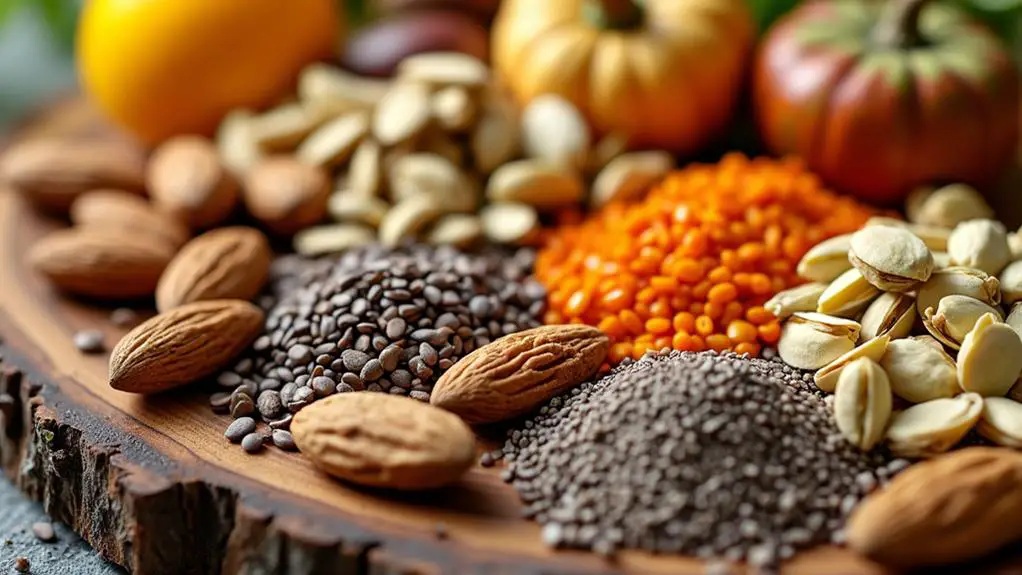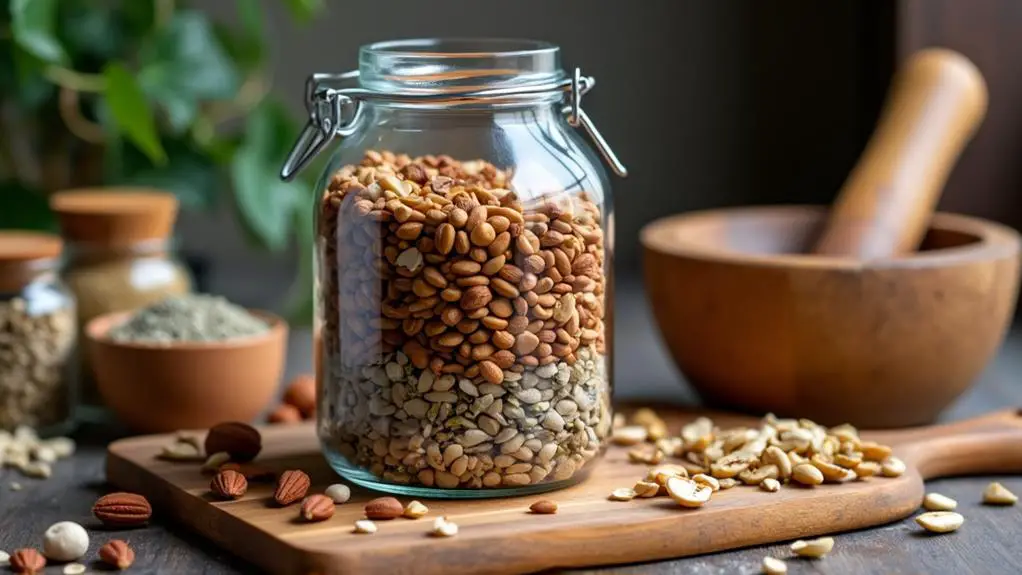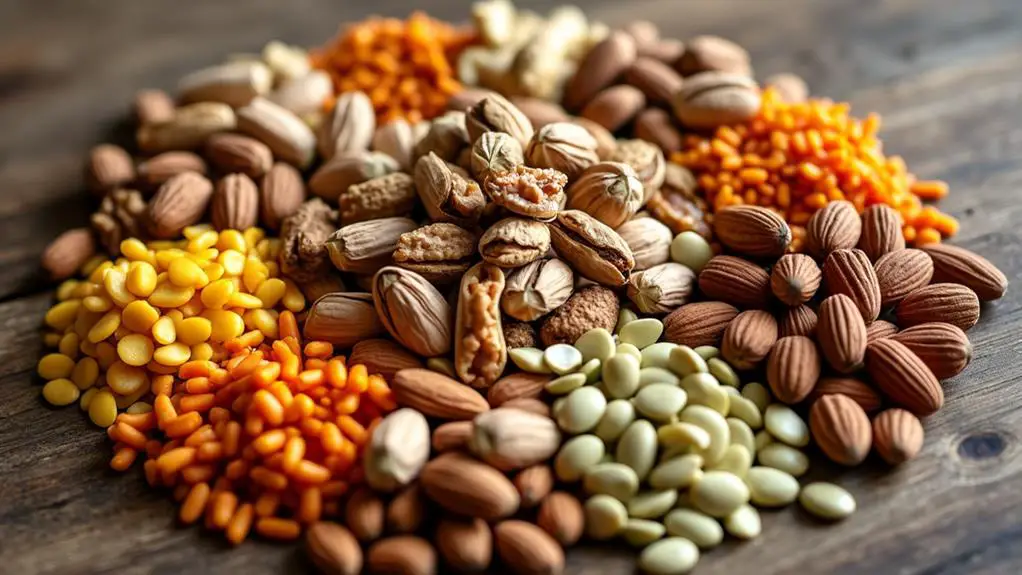Exploring Different Types of Nuts and Seeds: Nutritional Powerhouses
Nuts and seeds are nutritional powerhouses that offer a wealth of health benefits. You'll find common varieties like almonds, walnuts, and cashews, as well as popular seeds like chia, flax, and pumpkin. These tiny packages are packed with protein, omega-3s, fiber, vitamins, and minerals. You can easily incorporate them into your daily diet by adding them to salads, smoothies, or as standalone snacks. Proper storage and preparation, such as soaking or toasting, can enhance their flavor and nutritional value. By exploring different types of nuts and seeds, you'll discover a world of diverse nutrients and culinary possibilities.
Key Takeaways
- Nuts and seeds are rich in proteins, omega-3s, fiber, vitamins, and minerals, making them nutritional powerhouses.
- Common varieties include almonds, walnuts, cashews, chia seeds, and flaxseeds, each with unique nutritional profiles.
- Incorporating 1-2 ounces of nuts and seeds daily can boost nutrient intake in salads, smoothies, or as snacks.
- Proper storage in airtight containers and preparation techniques like soaking or toasting enhance flavor and digestibility.
- Experimenting with different types of nuts and seeds ensures a diverse intake of essential nutrients.
Common Varieties of Nuts
Several common varieties of nuts offer unique nutritional profiles that can boost your overall health.
Almonds are packed with vitamin E and provide about 6 grams of protein per ounce, while walnuts are known for their heart health benefits due to high omega-3 fatty acid content.
Cashews contribute to your energy levels with magnesium and iron, offering around 5 grams of protein per ounce.
Pecans are rich in antioxidants and healthy fats, promoting heart health and satiety with 3 grams of protein and 2.7 grams of fiber per ounce.
Hazelnuts support skin health and digestion, containing significant amounts of vitamin E and providing 4 grams of protein and 3 grams of fiber per ounce.
Pistachios stand out for their high dietary fiber content, offering about 3 grams per ounce and aiding in digestive health and weight management.
Popular Types of Seeds
Seeds pack a powerful nutritional punch, rivaling nuts in their health benefits.
You'll find chia seeds are nutrient-dense, offering 10g of fiber and 5g of protein per ounce.
Flaxseeds boast high omega-3 content, with 6g of protein and 8g of fiber per ounce, supporting heart and digestive health.
Pumpkin seeds, rich in magnesium and zinc, provide 7g of protein and 1.7g of fiber per ounce, boosting immune function and muscle health.
Sunflower seeds are packed with vitamin E and selenium, containing 6g of protein and 2.4g of fiber per ounce, promoting antioxidant activity and skin health.
Sesame seeds offer calcium and healthy fats that help bone and heart function, with 5g of protein and 1.1g of fiber per ounce.
These popular seeds deliver impressive nutritional benefits, making them excellent additions to your diet.
Nutritional Profiles and Benefits

Now that we've explored popular seed types, let's examine the nutritional powerhouses that nuts and seeds truly are. These small but mighty foods pack a punch when it comes to health benefits.
You'll find they're rich in protein, omega-3 fatty acids, fiber, vitamins, and minerals. Almonds, for instance, offer 6 grams of protein and 3.5 grams of fiber per ounce, while chia seeds boast an impressive 10 grams of fiber in the same serving.
Walnuts are an excellent source of heart-healthy omega-3s, specifically alpha-linolenic acid. Sunflower seeds provide vitamin E and selenium, boosting your antioxidant function and immune support.
Pistachios contribute to digestive health with their high dietary fiber content. By incorporating a variety of nuts and seeds into your diet, you'll enjoy a wide range of nutrients that support overall health.
Incorporating Into Daily Diet
Enthusiasts of healthy eating know that incorporating nuts and seeds into your daily diet doesn't have to be a chore. These nutritional powerhouses offer numerous health benefits, from providing essential nutrients to supporting weight loss and boosting energy levels.
To easily incorporate nuts and seeds into your meals, try these simple strategies:
- Add 1-2 ounces to salads, yogurt, or oatmeal for extra crunch and nutrition.
- Blend them into smoothies for a protein boost.
- Use ground nuts or seeds as gluten-free flour substitutes in baking.
Experiment with various types to diversify your diet and maximize health benefits.
Create custom trail mixes for a convenient, energizing snack that supports sustained energy levels. By incorporating nuts and seeds creatively, you'll enjoy their good fats, protein, and other essential nutrients while enhancing the flavor and texture of your meals.
Storage and Preparation Tips

Proper storage and preparation are key to maximizing the nutritional benefits and flavor of nuts and seeds. To maintain freshness, store them in airtight containers in a cool, dry place. Always check for damage when purchasing, avoiding cracked or broken pieces.
For enhanced digestibility and flavor, consider soaking your nuts and seeds overnight. This simple step can make them easier to incorporate into recipes. When preparing, try toasting them lightly to boost crunchiness and taste. For maximum nutrient absorption, grind seeds like flax and chia before consuming.
| Storage | Preparation |
|---|---|
| Airtight containers | Soaking overnight |
| Cool, dry place | Light toasting |
| Check for freshness | Grinding seeds |
| Avoid damaged pieces | Enhance flavor |
Conclusion
You've now begun a nutty adventure through the world of nutritious kernels and seeds. From almonds to chia, these tiny powerhouses pack a punch of health benefits. As you've learned, it's easy to sprinkle these nutritional gems into your daily diet. Remember, proper storage is key to maintaining their goodness. So, why not go nuts and seed your meals with these crunchy delights? Your body will thank you for this tasty investment in your health.







